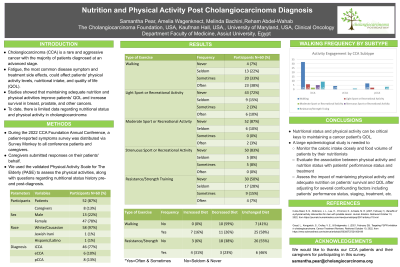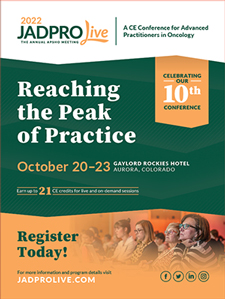Back

APSHO Patient Perspective Posters
JL1013P: Nutrition and Physical Activity Post Cholangiocarcinoma Diagnosis
Saturday, October 22, 2022
10:00 AM – 11:00 AM ET

.jpg)
Samantha N. Pear, MPH (she/her/hers)
Senior Associate
Kauffman Hall
Chicago, Arizona, United States
Poster Presenter(s)
Background:
Cholangiocarcinoma (CCA) is a rare and aggressive cancer with many patients diagnosed at an advanced stage. Fatigue is the most common disease symptom and treatment side effects. This could affect patients' physical activity levels, nutritional intake, and quality of life (QOL). Previous studies have shown that maintaining adequate nutrition and physical activities improve patients' QOL and increase survival in breast, prostate, and other common cancers. To date, there is limited data regarding nutritional status and physical activity in cholangiocarcinoma patients.
Methods:
During the 2022 Cholangiocarcinoma Annual Conference, a patient-reported symptoms survey was distributed via Survey Monkey to all conference patients and caregivers to assess the CCA patients' physical activity and nutritional status (making this a convenience sample). The participating caregivers submitted responses on their patients' behalf, reflecting their current physical activity and nutritional status. We used the validated Physical Activity Scale for The Elderly (PASE) to assess the physical activities, along with questions regarding nutritional status history pre- and post-diagnosis.
Results:
Out of 94 participants, 60 completed both the PASE and nutrition survey. The surveys were completed by 52 (87%) patients and 8 (13%) caregivers. Of those 60, 43 (71%) walked at least 3 days a week on an average of less than one hour per day, and 30 (50%) never did any muscle strengthening exercise. The association between walking frequency and alteration in dietary habits post-diagnosis over the last 2 weeks was evaluated. CCA patients who walk ≥ 3 days/week are less likely to experience a change in their dietary habits, with 16% reporting an increase in food intake, 26% reporting a decrease in food intake, and 51% reporting no change. In contrast, patients who maintained strength/endurance training for ≥ 3 days/week were 40% more likely to experience a change in diet when compared to the group that did not participate, including 31% reported an increase in food intake, 23% reported a decrease, and 46% unchanged.
Conclusion:
Nutritional status and physical activity can be critical keys to maintaining a cancer patient's quality of life. Exercise and following a well-balanced diet can improve overall health during treatment. However, these findings may not apply to the whole cholangiocarcinoma patient population. A large epidemiological study is needed to i) monitor the caloric intake closely and food volume of patients by their nutritionists, ii) evaluate the association between physical activity and nutrition status with patients' performance status and treatment, and iii0 assess the impact of maintaining physical activity and adequate nutrition on patients’ survival and QOL after adjusting for several confounding factors including patients’ performance status, staging, treatment, etc.
Cholangiocarcinoma (CCA) is a rare and aggressive cancer with many patients diagnosed at an advanced stage. Fatigue is the most common disease symptom and treatment side effects. This could affect patients' physical activity levels, nutritional intake, and quality of life (QOL). Previous studies have shown that maintaining adequate nutrition and physical activities improve patients' QOL and increase survival in breast, prostate, and other common cancers. To date, there is limited data regarding nutritional status and physical activity in cholangiocarcinoma patients.
Methods:
During the 2022 Cholangiocarcinoma Annual Conference, a patient-reported symptoms survey was distributed via Survey Monkey to all conference patients and caregivers to assess the CCA patients' physical activity and nutritional status (making this a convenience sample). The participating caregivers submitted responses on their patients' behalf, reflecting their current physical activity and nutritional status. We used the validated Physical Activity Scale for The Elderly (PASE) to assess the physical activities, along with questions regarding nutritional status history pre- and post-diagnosis.
Results:
Out of 94 participants, 60 completed both the PASE and nutrition survey. The surveys were completed by 52 (87%) patients and 8 (13%) caregivers. Of those 60, 43 (71%) walked at least 3 days a week on an average of less than one hour per day, and 30 (50%) never did any muscle strengthening exercise. The association between walking frequency and alteration in dietary habits post-diagnosis over the last 2 weeks was evaluated. CCA patients who walk ≥ 3 days/week are less likely to experience a change in their dietary habits, with 16% reporting an increase in food intake, 26% reporting a decrease in food intake, and 51% reporting no change. In contrast, patients who maintained strength/endurance training for ≥ 3 days/week were 40% more likely to experience a change in diet when compared to the group that did not participate, including 31% reported an increase in food intake, 23% reported a decrease, and 46% unchanged.
Conclusion:
Nutritional status and physical activity can be critical keys to maintaining a cancer patient's quality of life. Exercise and following a well-balanced diet can improve overall health during treatment. However, these findings may not apply to the whole cholangiocarcinoma patient population. A large epidemiological study is needed to i) monitor the caloric intake closely and food volume of patients by their nutritionists, ii) evaluate the association between physical activity and nutrition status with patients' performance status and treatment, and iii0 assess the impact of maintaining physical activity and adequate nutrition on patients’ survival and QOL after adjusting for several confounding factors including patients’ performance status, staging, treatment, etc.

